L. Desharnais
Haunted, “Thick and Dumb” Libidos
ISSUE 58 | LIQUIDITY | NOV 2015
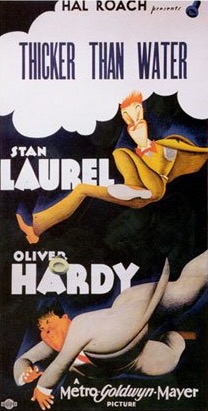
…sperm, river, drainage, inflamed genital mucus, or a stream of words that do not let themselves be coded, a libido that is too fluid, too viscous: a violence against syntax, a concerted destruction of the signifier, non-sense erected as a flow, polyvocity that returns to haunt all relations.— Deleuze and Guattari, Anti-Oedipus
At the beginning of the Laurel and Hardy episode “Thicker than Water” (1935), Hardy’s wife forces the two to do the dishes instead of going to a baseball game. The chore ends in a fiasco, of course. They add too much soap to the water. As Laurel dries Hardy’s washing, he places the clean dishes where the dirty ones had been. Hardy eventually catches the repetition, scolding Laurel, who then places the dishes to dry on a stove burner. Laurel’s next mishap is revealed to Hardy when he picks them up in order to put them away. He drops them abruptly and the whole stack smashes to pieces. Throughout this opening scene there is already the sense that they are not quite at home here with all these objects, not only because they are men doing what is structurally allotted women’s work, but also because they function symbiotically and mechanically as one mind split across two bodies, and at times, one body for two minds. On German television, they are appropriately called “Dick und Doof” – thick and dumb – with no need even for personal, subject-based predicates. They are how they act.
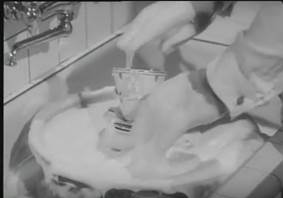
The moment Hardy drops the dishes the doorbell rings. He tells Laurel to answer. At this moment, the viewer is made privy to a gratuitous close-up of his hands soaking in the too-thick, soapy dishwater. Laurel discovers a smarmy creditor has come round to collect payment for the furniture. He answers with his typical dislocated, anarchic cool, saying that Hardy is “home but not in,” then closes the door. The creditor rings again and Har-dy’s wife lets him in while calling Hardy. Why is he here? She gave the money to Hardy. But Hardy confesses he gave the money to Laurel, with dry hands free of both soap and blood, to pay the creditor. Everyone turns to Laurel who eventually utters how he used the money like it was any other money, as a pure liquid currency useful for any debt, to pay Hardy’s wife for his room and board. She reaches down her blouse, to where the money for the furniture had safely returned to, and shamefully hands it to the creditor. The creditor in turn is dumbfounded by this liquidity – like that of the dishwashing soap Hardy plunges his burning hands into – and by their non-normative living structure more broadly. He leaves anxiously and so does Hardy’s wife, in a huff. Still living in the Great Depression, the home where Laurel and Hardy settle after many years of looking for work is still not wholly theirs. Most of what surrounds them is not really there, that is, it speculatively exists.
If, as Marx made clear, production not only produces an object for the subject but also a subject for the object, Laurel and Hardy’s unorthodox life-form leaves them in a limbo appropriate to such a speculative habitat with needs and tendencies askew – and this is funny. Lazing on the couch after the creditor scene Laurel chimes in to Hardy’s thoughts, which, since they share an ego, are as much his own anyway, thus putting in play the rest of the episode’s events: why don’t they go take all of their savings out of the bank and pay the furniture creditor completely off? The logic the experience set in place is that dealing with creditors is a nasty thing and one should avoid this, even if one is left penni-less and can buy no more. At least the things that surround them, including the couch they have sunk into, will really exist. Then, to further convince Hardy, Laurel dismisses the wife’s reaction to his counterproductive anarchic liquidity, essentially, her approach to money: “She talks to you like water off of a duck’s back.” It is the mode of speech that merits the metaphor for what Laurel intuits as the wife’s “necessary false consciousness,” how words frame money, not the content of the words themselves.
In their first sustained collaboration, Anti-Oedipus (1972), Deleuze and Guattari take up Freud’s ambiguous delineation in his late text, “Analysis Terminable and Inter-minable,” (1937) between a viscous and a liquid, all-too mobile libido.
The difference between the two types is comparable to the one felt by a sculptor, ac-cording to whether he works in hard stone or soft clay. Unfortunately, in this second type the results of analysis often turn out to be very impermanent: the new cathexes are soon given up once more, and we have the impression, not of having worked in clay, but of having written on water. In the words of the proverb: ‘wie gewonnen, so zerronnen.’1
Both descriptions of the libido’s flow resist successful transference in analysis.2 A viscous libido is one that does not let go of its “cathexes”3 making transference impossible, whereas a liquid libido is keen to make the connection. But there is no promise this trigger happy libido, whose love-objects are readily replaceable and expendable, will not move on just as easily to a new one during or after the process. Deleuze and Guattari extend Freud’s concept of libidinal liquidity into an elucidation of their own “phenomenon of desire” as “qualitative flows” (that are equally neither natural nor spontaneous.) What they question is reading liquidity as an obstacle to the cure, rather than a limitation to psychoanalytic methodology itself. “Life flows” out of the Oedipus triangle and, with a messy insurrectionary polyvocity, out any concept of the unconscious structured like a language. Into the desert and perhaps back again. Only those intent on decoding such flows, rather than further scrambling them in a delirium of desire, find the dead-end either-ors between viscous and liquid, thick and dumb. Foregoing any conception of structural guilt or lack — any haunting — the libido simply gets trapped, screened or netted in different forms. And a particularly pernicious form is psychoanalysis itself.
But André Green, a dissident disciple of Lacan’s, is nonetheless quoted approvingly here by D&G. Green describes not individual libidos as “viscous” or “liquid,” but particular analytic sessions.4 What hinders a session thus transpires relationally between the analyst and analysand in the kind of environmental ‘skin’ that is co-produced. The viscous resistance of a “hysterical form” produces a “heavy, weighty, boggy climate” and a “sticky transference” whereas the liquid “obsessional form” is defined by an “extreme mobility of representations” in “torrential” speech – nothing sticks and the analysis “slides off the couch like water off a duck’s back.” Here we find the same metaphor Laurel uses to describe the liquid, seething silver-screen speech of the 1930s white housewife. Resolutely exterior to any analytic situation, her words slide awkwardly alongside the residue of a set of stock silent gestures internalized like lost love-objects. But Hardy’s wife is more concerned with her credit-based financial assets, another type of liquid moving through her fingers, than any love-object – especial-ly not one that is both doubled and split. And there is nowhere else to take her “life flows” or discharge affect in a psychoanalytic abreaction — her own Umwelt settled as both a source of stimulation and field of action — except the bank. “You tumbleweed!” she calls Laurel, clearly already finding herself surrounded by a type of desert that will only keep turning in, and back, on itself.
But why do Deleuze and Guattari agree at base with Freud about a “liquid” quality to the libido or use the concept of the libido at all? Is it because it just lacks lack? What changes does the concept itself undergo in their appropriation? It’s useful first to take a closer look at Freud’s conception of the libido as a development of instinct theory.5 The term is by no means straightforward – and neither are the categories that congregate around it. Libido, deriving from the Latin word meaning “to wish or desire”, is a kind of empirically unmeasurable but nonetheless quantitative “energy” that for Freud is necessarily sexual. Famously, libido is to love as hunger is to nutrition.6 It is at once a liquid energy that inhabits series of investments and the name, or placeholder, for the transformations of the sexual instinct itself. The difference for Deleuze and Guattari is that such transformations are never de-sexualizations or sublimations — never a return to an originary lost love-object — but always drive a positive, vital force.7 For them, Freud’s framework negatively limits this positive “liquid flow” which could otherwise overturn capitalism and its dualisms (proposing another nonetheless between molecular and molar, a Baroque folding in lieu of dialectics.)8
For Freud’s negatively limited model, the amount of ‘reality’ one can take in is always chosen and tailored to specific needs. These needs derive from either fantastical or mate-rial traumas (or both) against which that a weak child-ego enacted repressions – du trop de realité. A sacrifice of truth for pleasure defines this partitioning of reality. Hence its negative dimension. And while this is what protects a ‘subject’ in the ‘symbol-ic’ or social, such defense mechanisms can become a danger themselves. Moreover, these ‘internal’ dangers that an adult ego faces are always no longer relevant responses to those left unresolved in childhood: life-as-afterlife stuck in the retrospective unfolding of a small being’s earliest impressions and events. The liquid is siphoned, thickened, diverted, sucked, squelched, blocked – and perhaps ‘tamed’ or ‘dammed’ in a newly created state by the analyst (that otherwise would not arise spontaneously.) It is when such taming translates to solidifying a good little symbolic subject that Deleuze and Guattari oppose a kind of liquidity that need not be backward looking or constitutively melancholic. The question is then to what extent their critique of Freud’s psychoanalytic framework can be socially generalized. Does the libido run underneath all entrapped life – so that a pinprick would send everything flowing – or is it to be seen as life itself? If the material, social reality of at least some operative dualisms or norms that violently divide and conquer life are of concern – that their fictional, constructed status is operative – how can such a positive concept of the libido, which indeed seems at times interchangeable with life in general, be maintained?
Even for Freud something of this liquid “energy” escapes the analyst, as he makes clear in “Analysis Terminable and Interminable,” – in its precisely virtual, temporal, potential and non-substantive character. He admits that even when one treated repression or symptom gives way to treatment, others will arise which may always have lain latent in the unconscious that the libido traverses. He uses the (un)timely example of different meth-ods of book-censorship to illustrate his concept of repression. He also introduces, perhaps half-unwittingly, his self-critique of the limits of psychoanalysis. One can cross out, burn, distort, interpolate single words, write the text completely anew but say the opposite, confuse future transcribers, translators and copyists, or completely omit chunks of text. The complete omission of text is the chosen metaphor for repression. But the diversity of methods one can use to obscure an ‘original’ text, let’s say assumed to be the ur-liquid, are so carefully explained that he betrays the precise equivocality of the libido, and any cured alteration, in the first place. A libido is thus either viscous or liquid, or somewhere in between, but it isn’t up to the analyst to say why that is so. The task is to either calm the erupting ripples or make some whirlpools, depending. Both the paradox and ma-terial approach of Freud’s method is that to analyze the libido’s processes – its own “sec-ond skin” or even a communicational peau commun to use Didier Anzieu’s beautiful formulation – one need not clarify its exact, impersonal, assemblage: “the libido theory becomes frankly speculative” in spite of its stated retrospective memory tracing of lost loves and Freud’s own “love of truth.” The libidinal subject here is a name for a type of action that it is not the agent of, inversely, evoking Deleuze and Guattari’s agencement9 du désir. Such a subject is the paradox of conceptualizing an ego constituted on loss.
Laurel and Hardy head to the bank before the wife, we do not know her name, gets there to ‘freeze’ her liquidity only to discover that it is all gone. The two have already arrived at the furniture store to pay off the debt, entirely, where they find an auction is taking place. The sign on the door reads liquidation:
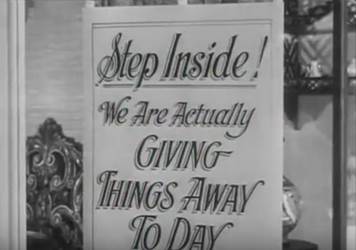
Sitting next to them is a rich woman who, having left her wallet at home, asks them to hold the bid for her. Hardy accepts, using the opportunity to show off his very white Southern gentleman style. But the two of them, Laurel and Hardy, start to compulsively bid against one another. They push one another’s limits to both intensify and tighten their reciprocity, raising the bid almost past the 300 dollars they have on them. Their rapid, diarrhea-like speech brings to mind the eternal repetition of the opening dish scene. Dish-es are washed again and again and words flow. But since there is no space to examine the silences in-between the words, where a dialogical recognition could be forged, this is nothing but hell. Such compulsivity may be explained by the commodity on sale, which happens to be a large grandfather clock. Time is ultimately all they want. When they win the bid, the creditor of course won’t have it. They hoist the clock over their shoulders like a piece of timber, cross the street, and drop it just in time for it to be smashed to pieces by a passing truck.
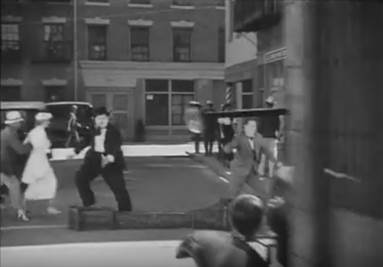

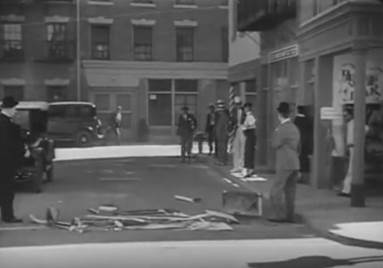
The time of work and of their lives — materialized in the savings and now the clock — disappears in an instant. A representable time, that is also always waged or indebted, ac-tually stops. But the episode we are watching rolls on. Spectators and characters remain equally haunted by so much lost time that is so much dead labor. Liquid “life flows” are absorbed by capital, no doubt, “as though its body were by love possessed.” For Deleuze and Guattari, such a vampiric love bent on reduction permeates even the analytic session. “We witness Freud's reductive glee; we literally see multiplicity leave the wolves to take the shape of goats that have absolutely nothing to do with the story. Seven wolves that are only kid-goats. Six wolves: the seventh goat (the Wolf-Man himself) is hiding in the clock.”10
Even the “viscous” libido entails an action, a stickiness that can also be undone, which subverts any strictly consecutive series of objects. But indeed the viscous libido – viscous, from viscum, a kind of gluey mistletoe whose berries are used to catch birds – is resolutely “adhesive” [Klebrigkeit] or loyal to the point where therapeutic action is severely hindered. Klebrigkeit also has a very everyday usage – sticky, clammy or slimy, bringing to mind the literal stickiness of a sex act, especially one taking place on a hot July day. But there is also the sense of mortification. Aging, lets say Freud wrongly emphasizes, increases libidinal inertia. Viscosity is a libidinal economy for an old, tired and overworked liquid. With Deleuze and Guattari, on the other hand, we find “amniotic fluid spilling out of the sac and kidney stones; flowing hair; a flow of spittle, a flow of sperm, shit, or urine that are produced by partial objects and constantly cut off by other partial objects, which in turn produce other flows, interrupted by other partial objects.”11 There is neither a pure loss of objects, then, nor a pure vital flow. The fetishistic partial object is always invading, producing and reproducing the changing state of liquidity (that cannot be dissociated from the body’s own fluid emissions.)
At the end of the episode, Dick und Doof return home to find a very livid woman. All she knows is that the money is gone. She goes swiftly to the kitchen, grabs the cast iron pan, climbs up on the chair – and bang! crashes it down on Hardy’s head, like a cuckoo bee-lining out of a grandfather clock at the strike of midnight. We say goodbye to Hardy’s wife at this point who has stood in throughout the episode for the punitive affectivity of value (dialectically opposed to the seductive wealth of the woman at the auction). We might ask upon her exit though, why a controlled cultural “banana-skin” behavior — in relation to love, money and language or otherwise — is still typically reserved for men, while the either/or between hysterics and silent linguistic shame remains a feminized experience?12
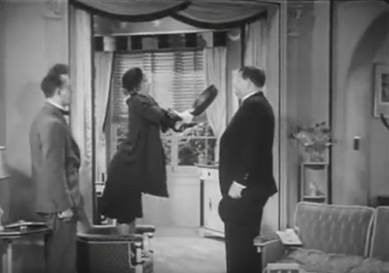
In the next scene we see Laurel amble into the hospital with a bouquet of flowers. Hardy is not well at all. As a last option the doctor suggests a blood transfusion between the two of them. The gloved hands that we find in close-up offer a vision of technocratic health modernity that contrasts with Hardy’s clumsy, soap-soaked paws drowning in debt. But even here we find an untamable messiness, evidenced in the small medical apparatus’s spark.
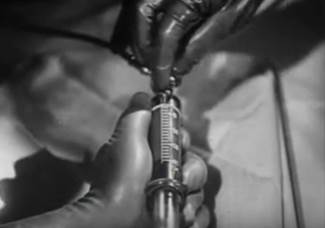
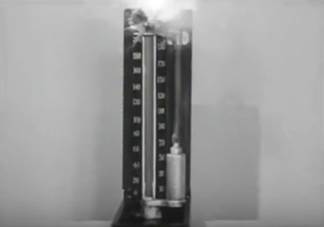
As they walk out of the hospital it is obvious that blood is not all that has been exchanged – they’ve completely exchanged characteristics, gestures and voices. But fundamentally, nothing in their symbiosis as Dick und Doof has changed at all. You even see more ex-plicitly exactly what makes them up as characters, as constructed egos: Laurel performs Hardy’s signature wave, Hardy emits dubbed Laurel’s cry with a daydreamer glaze. Soapy dishes, money and blood are the liquids that run across and through them — all thicker than water — to bind them together as a complicit life-form moving through what they can see of the world. They are at once a resolutely viscous and a liquid ego, able to both be each other’s objects of investment and completely shed their in-dividual predicates within such a relation. Or, following Deleuze and Guattari, Laurel and Hardy are that desiring machine that is always a “binary machine: one machine is always coupled with another…There is always a flow-producing machine, and another machine connected to it that interrupts or draws off part of this flow (the breast—the mouth).”13 But Dick und Doof both nourish and destroy one another. Each of these early episodes move between different precarious situations – with new wives and new workplaces, from a brain surgery office to an electrical hardware store – to supplant any steady narrative of either a repeated melancholic, libidinal loss as ego or an “amorphous fluid of antiproduction.” Their libidinal ambiguity, it feels clear throughout the episode, produces itself upon encountering conditions of socio-economic crisis that nevertheless must be absurdly reproduced somehow – from a white working class to aspiring middle-class perspective — which functions as a circular, comedic technique to ease the strains of that crisis (but not to destroy the hell that brought it into being.)
This text is the product of a severe kidney infection that also led to my first en-counters with L&H, Anti-Oedipus and Freud’s “Analysis Terminable and Interminable.” Thank you to the Hypocrites, Rachel Baker, Anja Kirschner, Rona Lorimer and Hannah Proctor for their feedback. And to S…
1 “Analysis Termi-nable and Interminable,” p. 241 (revised 1950 English translation.) German title “Die Endliche und Die Unendliche Analyse.”
2 Freud’s text itself raises many self-reflexive ethical and temporal questions, losing former optimism in “cures.” If you cure one neurosis, what’s to say another won’t arise? Spurred from some new trauma or experience? If you see it prefigured, do you bring it out, or let a sleeping dog lie?
3 Freud found James Strachey’s English translation of Besetzung as cathexis to be too technical. Most of Freud’s terms come from everyday usages and Besetzung has several: a group of actresses besetzt a set of pre-established roles a director had in mind; we besetzt a building, church, telephone line or bathroom. There is also the sense of a military occupation by invading troops – running and slipping, dividing up and extracting life flows.
4 Anti-Oedipus, p. 66.
5 Another “liquidity” link is to hypnosis. Cf. Leon Chertok and Isabelle Stengers’ A Critique of Psychoanalytic Reason: From Lavoisier to Lacan (1989 in France) where they focus on hypnosis as a wayward precursor to psychoanalysis. Hypnosis, invented by Franz Anton Mesmer from whom the English word mesmerize derives, was based on the presupposition that the influence living bodies exercise on one another is explained by a magnetic fluid. A commission by Louis XVI proved that this so-called “magnetic fluid” does not exist and can be explained by the combined influence of “imitation, imagination and touch” — paving the way for the psychoanalytic “science” out of this “irrationality” that Freud even called “barbaric.” Chertok and Stengers trace the history of hypnosis, and its potential as a kind of “anti-psychoanalysis,” in their critique. Indeed any claims for the “science” of Freud’s liquid libido seems on par with Mesmer’s.
6 Cf. “On the Universal Tendency to Debasement in the Sphere of Love (Contributions to the Psychology of Love II)” where Freud describes two ‘currents’ of the libido’s ‘developmental history’: the sensual and affective. The two are to conjoin for a ‘normal’ love relation, leaving no room for any non-neurotic ‘perversion.’ For Freud, unlike Lacan, love is a development, not an opposite, of sexual desire.
7 Cf. Deleuze’s ex-cellent 1967 text “How do We Recognize Structuralism?” where the same refutation against lack (of the empty signifier for instance) is formulated as the positive character of a question or problematic posed — as a problem of method.
8 “…[Reich] double pole of the libido, as a molecular formation on the submicroscopic scale, and as an in-vestment of the molar formations on the scale of social and organic aggregates.” (Anti-Oedipus, p. 292)
9 An everyday term connoting ordering or arranging (agencer the furniture) translated as “assem-blage.” Lost in translation is the contradictory sense of impersonal agency as a configura-tion or way within which agency takes place.
10 Thank you to Hannah Proctor for pointing to this passage in A Thousand Plateaus in her gener-ous comments and associations.
11 Anti-Oedipus, pp. 5-6.
12 Thank you to Rachel Baker here for her comments: “Banana-skin tripping (foolishness) by men is for-givable, acceptable, loveable even, in women it is undesirable, unforgivable.”
13 Anti-Oedipus, p. 5.